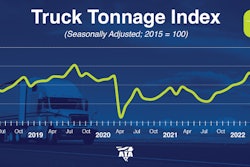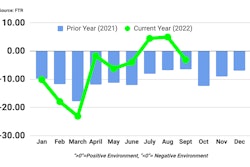A looming rail strike next month would send an aftershock through the trucking industry as the flow of goods via rail would need to be rerouted by truck – the capacity for which doesn't exist in large quantities.
Pangs felt first and foremost would be from the national fuel supply, including diesel exhaust fluid, said NATSO, the trade group representing the nation’s travel plazas and truckstops, and SIGMA: America’s Leading Fuel Marketers, the national trade association representing fuel marketers and convenience store chain retailers in the United States and Canada.
"If a work stoppage were to occur, it would immediately disrupt fuel marketers’ ability to ensure a reliable and stable supply of fuel for U.S. consumers and for the nation’s commercial fleets," Tiffany Wlazlowski Neuman, NATSO’s vice president of public affairs said via statement Monday. “A prolonged railroad shutdown will constrain the nation’s fuel supply by disrupting the availability of ethanol, which is often an essential component of gasoline and diesel exhaust fluid, which most heavy- duty trucks need to run. The U.S. economy in many ways revolves around transportation fuel, and if the necessary components to that fuel cannot get to where they are needed, the market impact will be drastic. The economic consequences will be catastrophic."
NATSO and SIGMA collectively called on Congress to intervene and "take aggressive action to resolve the ongoing labor dispute within the rail industry."
Twenty-seven trucking associations on Monday co-signed a letter to Speaker Nancy Pelosi, Majority Leader Chuck Schumer and Republican Leaders Mitch McConnell and Kevin McCarthy, beseeching Congress "be prepared to intervene before the end of the current 'status quo' period on December 9 to ensure continued rail service should railroads and four unions fail to reach a voluntary agreement."
Pelosi issued a statement Monday saying the House will proceed this week with legislation that adopts the tentative agreement reached between unions and railroads in September to avert a national rail strike, but "at the same time, Democrats are continuing to fight for more of railroad workers’ priorities, including paid sick leave."
The nation's largest rail union, SMART Transportation Division, earlier this month declined a contract proposal in part brokered by the White House, putting the potential of a national railroad strike back on the table next month. The U.S. narrowly avoided a strike in September, which experts said would send a shock though the supply chain rivaling a catastrophic weather event. SMART-TD could strike Dec. 9, or the rail carriers could lock out workers, unless Congress steps in. Rail unions have what is generally referred to as a "me too" agreement where the terms agreed to by the last holdout will trickle down to all the others, and if all 12 unions don't agree, then all 12 could potentially strike.










